“We’re at a point where we have to ‘multi-solve’ & understand the challenge from all possible perspectives”
A rich and insightful discussion about the need to rebuild our systems differently using more regenerative models. We discuss how to actually make this a reality in society and organisations today. How can we use different lenses to understand the interconnectedness of the different layers of the ecosystem, and create leaders and an environment that is deliberately developmental ?
Building capacity to thrive both at an individual and collective level is key and we dig deeper into how to consciously build emotional and business capacity to navigate uncertainty and the stories we tell ourselves to make meaning of the way forward whether as an individual leader or as a collective community.
Graham shares his insights, research and experience in this field from working with corporations, start ups and institutions across the globe.
The main insights you’ll get from this episode are :
- From a global perspective, we must rebuild to prevent further catastrophic consequences of our actions (e.g. humanitarian and environmental). There are two main elements of building: creating a fundamentally different system, rather than finetuning an existing one; and rebuilding: using the existing valuable elements we have to recreate rather than start from scratch.
- This difficult process is full of both complementarities and polarities, e.g. disagreement does not equal false and the opposite of truth is not necessarily false, but a different, equally valid, truth. Two fundamentally different concepts can co-exist in a relationship of tension, as is often the case in the scientific world (such as the dynamic interplay between muscle and bones in legs to provide motion).
- Responding adequately to a changing situation requires a variety of responses and perspectives (cf. Elizabeth Sawin’s ‘multisolving’). We must see the interrelations between problems and between solutions. Opposites are not mutually exclusive, and a lot depends on the stories we tell ourselves, and how we view them. Systems are dynamic and balance is in a constant state of flux. ‘Multisolutions’ generally offer a far higher ROI.
- Different ecosystems – internal, interpersonal, organisational, company-level, local economic/social/environmental and global – all contain potential and we must understand all the different parts and how they interrelate. Uncomfortable truths and sensitivity to issues sometimes prevent us from recognising that we must accept and grow ‘the whole’, not diminish it by removing parts of it.
- We must harness – as opposed to manage – conflict and build the capacity to thrive, beginning with ourselves. Emotional capacity comes from our interpretation of the multiple stories available, leading to greater understanding. Rather than seeing problems that require solutions, why not see them as mysteries to explore and facts to discover.
- Organisations must choose a model that works for them – beware replication! There is strength in uniqueness. We must think more broadly to bring about change. We must see clearly what is hidden or assumed in order to shape possible and impossible actions in a safe, anti-fragile way.
- People are complex open systems too. Organisations must examine the interrelations between them and how they can have a knock-on effect. There must be a frame of reference for assessing what is good, bad, true or false, and comparison between data and the frame of reference when making a decision.
- Bringing the systemic binary approach and the human approach together is complex. For example, if the consumer is boss, this is not evident on an organisation’s orgchart and this particular stakeholder is ‘invisible’. Power is necessary – it ‘gets stuff done’ – but so too is hierarchy, but this must be functional, not ego-driven.
- The boundary between an organisation and the rest of world is semi-permeable (via consumers). Sometimes investors are the boss, not consumers and organisations are often ‘isolated’ from the bigger picture. We must build a regenerative economy, or at least a circular economy, that gives every capital its place in the whole.
- If we are miserable working for companies that we feel are harmful to the world at large, be it environmentally or ethically, for example, we can start ‘MacGyvering’: use what we have to hand to address the challenge we face? We mustn’t give up. We must develop our ‘inner psychopath’ and override our feelings to do what is best. What must ask ourselves what the good is that could come out of a bad thing?
- We must have hope and seek alternatives, also from others. Power and success come from engaging and reincorporating all stakeholders – if everyone is invested in the cause, the outcome will be more positive. Collective power = collective good in a culture of courage, but unfortunately all too often the culture is one of fear or ignorance.
- We must experiment and suggest things that work elsewhere and are currently worth trying. They may not necessarily be the best, but they are the best we are aware of. Delve deeper into specific concepts to redesign your organisation.
- Start-ups offer an opportunity to create a whole (new) life for yourself. Develop deliberately developmental practices, whether you are an intra- or entrepreneur.









